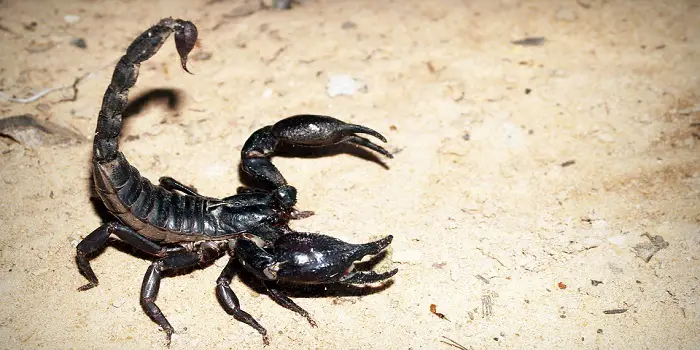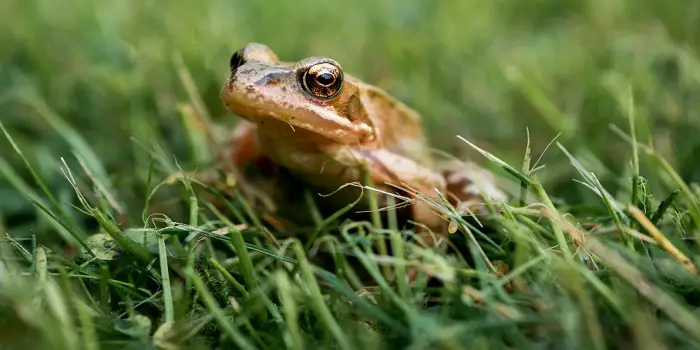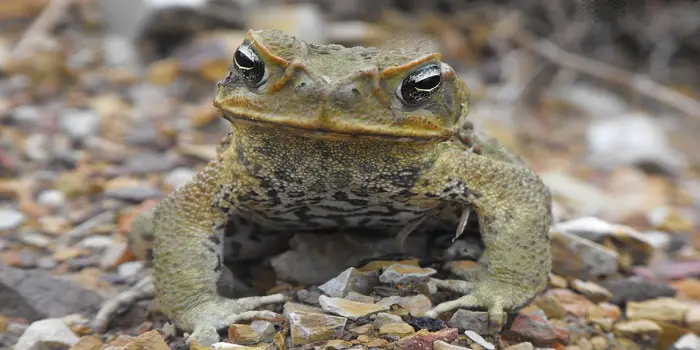
At first glance, skunks seem like small, harmless creatures.
For the most part, they only come out at night, they love to eat bugs, and they mostly stay away from humans.
However, their means of self-defense make them one of the most avoided of all animals.
And that is their ability to spray! And that is what makes them smell very bad.
Skunks have two glands under their tail (one on each side of the anus) which allows them to spray a substance that is a combination of methyl and butyl thiols.
This sulfur-based compound gives it a distinctive, powerful odor leaving skunks to stink so badly.
Skunks can spray up to 3ft with accuracy, and they usually do it to defend themselves against any predator or to just show their mischievous nature.
The foul smell of the spray is so horrible that even big bears move away from the place when they perceive such an odor.
The sprayed compound can also be dangerous if it comes in direct contact with skin or eyes, which may result in skin irritation and temporal blindness.
If you have been in contact with a skunk, the substance can still be present on your clothing or skin long after it dries.
This means it can be reactivated to cause a bad smell when it contacts water.
How to Get Rid of Skunk Smell?
Skunks (also called polecat, black-and-white mammal) are carnivorous mammals of the Mephitidae family and not rodents.
Since skunks will spray when they feel threatened or surprised, even if you are careful, it is still possible to be on the wrong end of a skunk.
The only advantage you have is that a skunk will normally stamp its feet or whip its tail before deciding to spray.
This may buy you enough time to get out of range.
However, if you are not so lucky, you will have to deal with the sulfurous scent of a skunk on your person.
Keep in mind that the longer you wait, the harder it will be to remove the odor.
This means that you need to act fast. Otherwise, you might be facing up to three weeks of smelling like skunk spray – this is usually the time for which skunk odor can last.
Fortunately, a few household items can help neutralize the odor generated by a skunk.
Be sure to have items such as baking soda, charcoal, and hydrogen peroxide handy, along with soap and water.
What follows are some proven methods to remove the odor of a skunk from your vehicle, clothing, home, pets, and your skin…
In the House
Skunks do not get into houses often, but it can happen.
If they spray their stink indoors, here is what you need to do.
- Open the windows and run the fans
- Heat up a pan of vinegar on your stove
Also, place dishes of vinegar around the house. Be sure to keep it out of reach of children and pets.
If you can locate the exact area where the skunk has sprayed, you’ll need to clean it thoroughly.
If not, the vinegar will cover the odor of the spray until it disappears.
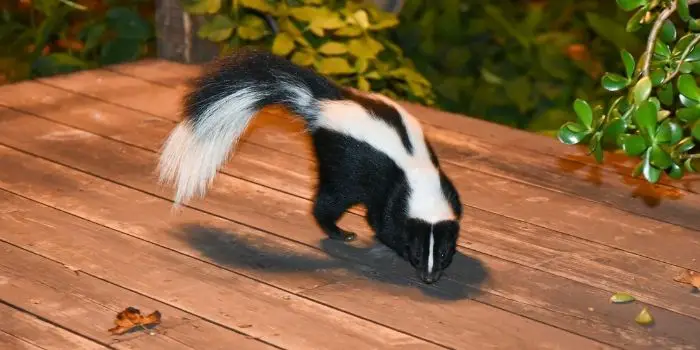
In the Car
Most likely, you hit the skunk with your vehicle, and the smell is incredibly bad.
Not only do you have to deal with the odor, but the remains of the skunk as well.
Fortunately, there is a proven formula for getting rid of the scent. Mix the following items together in a bowl.
- Hydrogen Peroxide: 1 quart
- Baking Soda: ¼ cup
- Liquid Dish Soap: 1 teaspoon
Dip a clean cloth into the mixture and gently scrub the inside of your vehicle. Be sure to cover all hard surfaces.
Once that has been cleaned, you’ll need to wash the carpet and upholstery with clean water.
You can go to a car wash if you want to use more effective tools to complete the job.
Once the inside is clean, you can wash your vehicle’s outside.
Again, a car wash is faster if you do not have the soap and water needed to wash your car at home.
This should take care of most of the odor. However, to remove any traces of the scent, put some charcoal in a small plastic cup or can.
Cut a couple of small holes in the lid and place it under the seat or in a cup holder for a few weeks.
Charcoal can soak up the remaining odor in the vehicle, so have it at the ready when needed.
On Your Clothing
If the clothing is washable, then you need to add one part of vinegar for every four parts of water in a bowl and soak your clothing for several hours or overnight.
Rinse, then wash in hot water using standard detergent and ½ cup of baking soda.
If your washing machine has a repeat rinse feature, use it.
Dry your clothes outdoors; do not use your dryer as it may only make the issue worse.
On Pets and Skin
If you or your pet gets sprayed by a skunk, and the odor sticks to the skin, it can be a most unpleasant experience.
The same treatment applies to both your pets and your skin, although you will have to be careful with your pet since he or she probably wants to get away from the odor.
Create the following mixture.
- Hydrogen Peroxide: 1 quart
- Liquid Dish Soap: 2 teaspoons
- Baking Soda: ¼ cup
Mix the ingredients together and shampoo over the place where the skunk has sprayed.
Be sure to wear gloves and do not touch your eyes at any time.
Work in the mixture to the skin or fur and rinse. Repeat until the odor is gone.
Keep in mind that baking soda is an odor neutralizer.
However, for it to work properly against the odor of a skunk, it needs both liquid soap and hydrogen peroxide to reduce the awful smell.
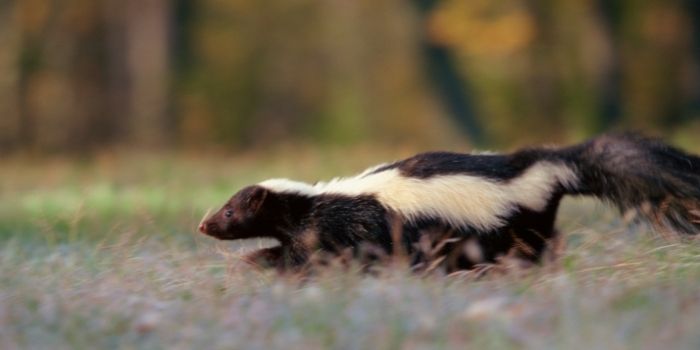
How to Get a Skunk to Leave Your House?
This will depend in large part on whether you are dealing with a family of skunks under the home or just a random skunk prowling for food and going through your yard.
Basically, skunks will run around in pairs or often alone, and there is little you can do if they go through your yard.
But that is mostly okay if you do not surprise them. If they are not surprised, they will not spray you.
But if you suspect that skunks are making their home under your home, now you need to remove them.
The best way is to hire a professional pest removal service or wildlife removal service that can cost anywhere from $125 to $400.
They have the knowledge, tools, and experience to get rid of the skunks while you stay safe inside.
However, there are a few DIY things you can do to dissuade a skunk from living on your property.
What follows are a few tips that will help you reduce the chances of having to call a professional to remove skunks.
- Remove Old Pet Food
- Tighten Garbage Can Lids
- Put Wire or a Fence Around Your Garden
- Fill Up Holes or Entrances Under Your House
- Spray for Insects and Grubs if You do not have Pets
- Secure Your Chicken Coop and Protect the Eggs
Making it more difficult for a skunk to call your place home will help you keep them away.
There are no guarantees, of course, and a skunk might still find your property something they like.
If you suspect that skunks might be inhabiting your yard, then do the following.
- Investigate the Presence of Skunks
- Set Catch and Release Traps
- Use Skunk Repellant Around the Yard and Home
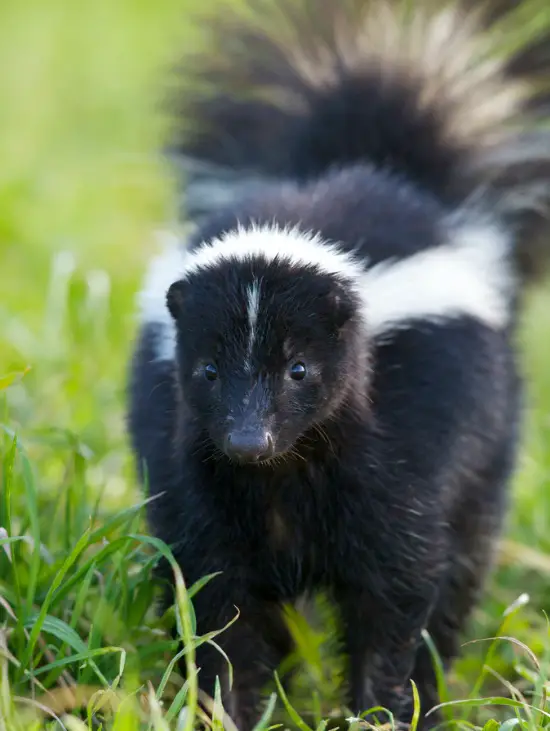
Home Remedies to Stop Skunks from Coming
There are a few home remedies and natural repellents that will keep skunks away while not harming your pets or family.
They should be placed around areas of the home where a skunk might try to find shelter or food sources.
Some of these repellents for skunks include the following.
1- Ammonia
The simplest and easiest to obtain, ammonia is a powerful repulsive compound that can easily keep skunks away from your yard for more than a month (or even longer).
You can place rags soaked in ammonia and sitting in buckets around your home.
The only downside is that you now have to deal with the ammonia odor, but it will keep the skunks away.
2- Urine of a Predator
Believe it or not, skunks do have predators which means that if they smell their urine, they will stay away.
Since dogs are one of the skunk’s predators, you can use the urine from your dog, assuming you can collect it.
If you cannot, you can also purchase it from a store where pesticides are usually sold.
These store-bought predators’ urine works as a great skunk liquid-repellent as it comes with few other natural ingredients that are known to irritate the sensory organs of the animal.
3- Hot Pepper Spray
Pepper sprays have the ability to irritate the eyes, skin, and nose of most animals. Skunks are no exception.
So, you can use these sprays as a very good repellent to drive away from the skunks.
Mix some hot peppers, jalapenos, and cayenne pepper into a boiling pot of water.
Let it cool for some time. And then strain the mixture so you can put it into a spray bottle.
Spray the areas (such as your garden, woodpiles, backyard, areas near garbage cans, entrances and exits in your house, etc.) every few days.
4- Citrus Fruit Peels
Although skunks carry a highly unpleasant odor, these same odorous creatures hate the pleasant smell of citrus fruits.
You can hence use the peels of citrus fruits to your advantage by dropping them around the perimeter of your property.
Get as many peels as possible and create a barrier by dropping them in 10 to 30 centimeters strips.
Make sure you use fresh citrus fruit peels as it carries more scent. Also, try replacing them as often as you can.
This will turn back the animals (as they want to cross) by making your home boundary a bit less welcoming for them.
5- LED Deterrent Lights
One of the most interesting of all skunk deterrents is the use of lights.
LED solar lights are currently used on farms to protect livestock, but they can be just as effective against skunks.
These solar lights are not used to illuminate an area. Instead, they are paired together as if they were the eyes of a predator.
Because skunks have poor eyesight, seeing what they believe to be a pair of eyes may keep them far away from your property.
And because the eyes do not move, the skunk will not have reason to react with surprise and spray, which is more good news.
Few Repellents You Can Buy
If you want to go for some ready-made repellents that can be bought from the store, you can try these:
- Bonide BND 2361 Granules
- Havahart Critter Ridder 3146
- Colton’s Naturals Small Animal Spray Repellent
- PREDATOGUARD Expel Natural Animal Repellent
All these products are biodegradable and Eco-friendly in nature.
Some of these are made from extracts of vinegar, paraffin wax, cinnamon oil, garlic oil, peppermint oil, etc., which can irritate the skunks and other small rodents very easily.
This also means they are not likely to cause any harm if you use them correctly according to the instructions mentioned on the label.
Also, these repellents can last for about 60 days to keep your place skunk-free.
How to Catch a Skunk Under Your House?
Well, skunks aren’t homeless, and they make a home for themselves at different places before settling in your house.
And their settling space will depend on how much they find the accommodating area in your home.
Depending on what these mammals are after, they can easily dig and burrow underground into your house to damage outdoor structures and even fenced-off buildings.
A major reason for the skunk to get under your home is that they are homeless and looking for shelter in an adaptable environment, mainly in the spring season.
The good news is that you can easily trap a skunk (without allowing them to spray) and leave them at a distance from your residence by following the below steps.
Step 1:
Buy a live cage trap that is around 30- inches in length and 15- inches in height.
This type of live trap will have sufficient space for them to move around comfortably but not to lift their tail up to spray.
And hence it doesn’t appear suspicious to the skunk.
Step 2:
Fix the trap firmly in the ground and ensure that it is still. Put it in the places where you have seen skunks coming.
Step 3:
Cover the cage with some cloth or something else to avoid making the skunk think of it as a possible trap for them.
If the exterior is good-looking, then you will certainly catch a skunk in no time.
Step 4:
Set bait for the skunk with something which is meat-based, for instance, cat food.
They are the best bait for skunks as they are a part of the weasel family.
If you don’t have cat food available, you can use bacon, chicken, insect larvae, canned sardines, or even bread and peanut butter.
Skunks usually have an excellent sense of smell. So, the smellier the bait is, the better it would attract them.
Put the bait in the cage in the direction from where the skunk can go into it.
Step 5:
Now, you need to be very careful and cautious if you want to catch a skunk without it spraying.
Do not get overwhelmed by the irritating, offensive odor.
As soon as the skunk enters the cage, you can reach out to the cage with complete caution holding a big piece of cloth as a prevention measure.
It can be a towel or an old piece of clothing.
Make sure you don’t get noticed by the skunk at all.
Just cover the cage with the cloth, and it won’t spray.
The trick here is if the skunk does not see you, it will not know where to spray.
However, if it sees you, it will get agitated and angry. In this case, if it sprays, you have no choice but to wait till it gets calm.
How to know when a skunk will spray?
There are three ways to discover that a skunk will spray. These are:
- The skunk will move back and forth and hit on the ground.
- The skunk will raise its tail. If it happens, just know it is furious, and hence you need to wait.
- The skunk will turn its rectum to you. if you notice this, then back off as soon as possible so that you don’t get sprayed because it definitely is preparing to spray that offensive liquid.
When catching a skunk, it is important to know if the skunk is an adult or a young one.
If you are facing a young skunk, you need to be more cautious as they say that they are more brutal in comparison to adults.
They are also known to spray premature liquid, which is more annoying.
Step 6:
And the final step is to carry the skunk to a remote location and leave it there. It is known as relocating.
All you need to do is pick up the cage after it is calm and put it in your vehicle’s trunk and go to a distant location and leave it out.
It means you relocated the skunk to a new place (a couple of miles away from your yard) which is legit and permissible.
But, if you don’t want to go through this stress, you can simply kill it.
Remember, if you decide to kill skunks, it may cause long-lasting air pollution, which cannot be eradicated easily.
Hence, it is suggested to just trap the being and follow the preventive measures against them to stop their re-visitations.
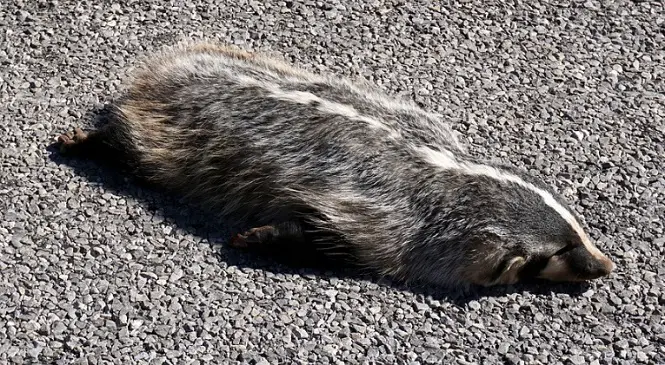
Can You Poison Skunks: What Are Your Possible Options?
Though using poison to eliminate skunks from your house is an inhumane act, then the animal itself is an act of inhumanity against human beings and the environment.
In some nations, you cannot poison an animal.
The poisons used to kill skunks are hazardous for the pets inside the house; hence it is suggested to keep the pets away if you are keeping poisoned food for the skunks.
a) Anticoagulant:
It is a rodenticide used to eliminate mice and rats. It includes compounds like bromadiolone, brodifacoum, difenacoum, warfarin, and more.
The combo leads to hazardous effects on the capillaries and causes internal bleeding.
It is extremely painful and the pain will continue for a few days till the rodent gets a hypovolemic circulatory shock and succumb to death.
b) Anti-freeze:
Anti-freeze acts like a poison that gives extreme pain to the animal before it dies; however, the procedure doesn’t take more than a day.
It contains compounds that have the potential to kill other pets too. Hence, you need to make sure that your pet is not around when you are using this poison.
Once the skunk has eaten the food with ethylene glycol, the liver changes it to glycolate and oxalate, which leads to severe cellular damage in the animal’s tissues, including the kidney and all the other parts of the body.
In the start, the animal will feel vomiting and nausea, and then its muscle will start twitching, followed by the kidney, liver, and every other part of the body, till it finally dies.
c) Bromethalin:
This kind of poison is hazardous for all mammals, human beings, fishes, pets, and birds.
When ingested, it destroys the nervous system leading to seizures and hyperthermia.
The poison works till the animal dies in around 36 hours. When using this poison, make sure you are extremely cautious.
Use surgical gloves and ensure that you wash your hands thoroughly after using them.
d) Cholecalciferol:
The animal can die within 24-36 hours after consuming this poison.
It leads to renal failure because of the production of hypercalcemia which causes calcification of the soft tissues of the system.
e) Strychnine:
The poison can kill all types of pests. It can be taken by inhaling or swallowing. It leads to convulsion in skunks.
And as the convulsion becomes extreme, the animal dies because of asphyxia or exhaustion.
Once you have used any of the poisons mentioned above, you can raid the holes around your house and look out for the dead skunks.
Other Related Questions:
Are skunks good to have around?
One main reason why skunk is considered healthy for your lawn is that they love to eat a large number of grass-destroying grubs in your garden and can help keep their population in control.
The only issue that farmers, gardeners, and homeowners face is the horrible odor these critters emit.
Plus, their waste can be dangerous, which is why it’s important to eliminate them from your property as soon as you notice any.
Is skunk spray dangerous for humans and pets?
High concentrations of skunk spray can be toxic and even fatal to humans as well as pets (that include your cats and dogs).
For both humans and pets, if the spray gets directly in the eyes or mouth, it can cause conditions like eye irritation, itching, nausea, vomiting, runny nose, coughing, gagging, and watering eyes.
For people with conditions with respiratory problems (such as COPD or asthma), inhaling skunk spray can also cause breathing issues.
How long and how many times can a skunk spray in a row?
Skunk’s spray is powerful, and they can shoot it up to 10-15 feet out of their anal glands.
Plus, if it’s required, they can spray this irritating foul-smelling musk up to five times in a row.
Although it’s only a defensive mechanism to fend off predators, the skunk’s spray can happen to be sometimes flammable (due to the thiols and sulfur-based compounds in it).
The Conclusion
Skunk remains can be dreadful because of the pungent odor it carries.
If you have any strong indication that a skunk is living on your property, then you should call a professional.
Otherwise, you can use predator urine to drive them out of their den and then seal up the area so they cannot return.
Getting rid of skunks is no easy task, but you can make it easier when you employ the right tactics.
Start by using deterrents and keep an eye on your garden and your pet’s source of food for indications of skunks making your home their home.
Share the post "How to Get Rid of Skunk Smell in House, Car & Clothing?"

Welcome to ProShieldPest.com. I am Tina Jones. I have been working as a pest removal professional in Winslow, Arizona lately. At present, I love to spend my time with my family as a retiree.
Here I share all my knowledge and experiences to help people understand better how they can stop pests at their homes without actually killing them. Hopefully, the information you will find here will help in safeguarding your home! You can check more about me here.

